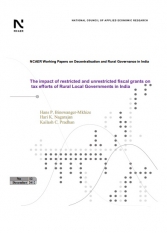The Impact of Restricted and Unrestricted Fiscal Grants on Tax Efforts of Rural Local Governments in India
Kailash Chander Pradhan
Hari K. Nagarajan
December 2012
This paper examined the impact of restricted and unrestricted fiscal grants on tax efforts of Rural Local Governments in India using ARIS/REDS panel data. We estimated the system as a whole via three stage least squares, where the first stage equations are the ones predicting the grants in order to deal with the simultaneities of grants received and taxation. The results have shown that a wage impacts on taxation exists, but is very small and, the productivity impact of grants on taxes is either zero or negligible. This means that incentives effects associated with the specifics of the intergovernmental fiscal system in the states is the main determinant of village taxation. We find that a bolder approach to shift about a third of the tied grants to block grants could lead own taxation to rise almost four fold. In the papers which analyze the services of education, health care and water supply we find the positive impacts of the village expenditures on these three services on choices, reduced private expenditures and outcomes.
National Growth and Macroeconomic Centre
Agriculture and Rural Development







